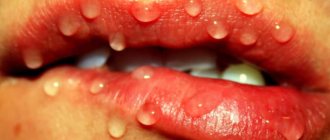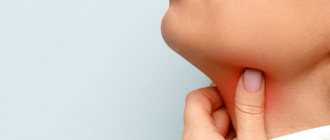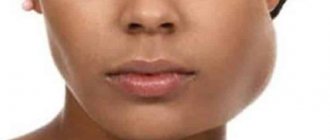Causes
The mucous membrane of the mouth is a fairly resistant surface to various influences. But when it is injured, or an imbalance occurs in the body due to diseases, an inflammatory process can occur, which leads to the formation of a bubble under the tongue. Other problems can also be the main causes of pathology.
If the ball under the tongue is small in size with transparent contents, this is a slight blockage of the salivary gland duct.
You can pierce it yourself with a needle treated with an antiseptic or heated over a flame. A small wound will remain in place of the ball, which heals on its own in 1-2 days.
Dentist
Novikova Olga Alexandrovna
8 years of experience
Injury
Mechanical disruption of the salivary duct of the gland leads to the thickening of the connective tissue and this causes the appearance of a ball under the tongue. A toothbrush with rough bristles, fish bones, a chipped tooth, a toothpick, breaking the cover, activates inflammation.
Antihygiene
In this case, a blister under the tongue appears due to failure to observe basic oral hygiene. This could be someone else's toothbrush, spoons, forks, or rare care.
Syphilis
This disease tends to negatively affect the condition of the mucous membranes, causing tumors.
Complications after illness
The bubble occurs after suffering from mumps, sore throat, or influenza. The salivary gland swells, and against the background of this, stagnation of secretion occurs.
Infection
Microtraumas that occur on the mucous membrane can be infected with bacteria and microbes, fungus, which leads to the formation of an inflamed blister.
Oncology
The disease provokes the formation of a tumor that puts pressure on the area under the tongue. In the early stages, the disease goes unnoticed, but over time, saliva production decreases and a transparent cyst appears, which eventually grows to 3 centimeters.
Food and medicine
A blood ball under the tongue appears for the following reasons:
- Injury that occurs from biting the mucous membrane while eating.
- Chemical burn.
- Hot food or drink.
- Medicines.
- Spicy and salty foods.
- Blocking the duct with a stone.
Ranula
A ball under the tongue can cause ranula. It appears against the background of an inflammatory process in the sublingual area or when the normal functioning of the salivary gland is disrupted. Initially, the disease manifests itself as a bluish discoloration in the oral cavity. After which a bubble appears, which after some time bursts and is observed again in the same place.
The formation of a ball under the tongue is promoted by injury, infection, syphilis, cancer, aphthous stomatitis, medications and food.
The pathology is asymptomatic. Sometimes bloody spots appear in the bladder.
An external examination, medical history, blood and saliva tests, puncture, and dental consultation can help identify the root cause.
For treatment, antiseptic and anti-inflammatory drugs, vitamins are prescribed, and the diet is changed. Surgical intervention is indicated for cysts and neoplasms.
Experts still cannot establish the causes of this disease. Some believe that the pathology arose against the background of an inflammatory process, while others suggest that these are epithelial inclusions of germinal origin. That is, the tumor is a cystic epithelial neoplasm.
The pathology develops against the background of blockage of the salivary gland duct and does not allow saliva to be released into the oral area. This leads to the fact that it accumulates in the gland, which increases to 5 cm in diameter. After which the formation is ruptured on its own or opened by a surgeon using a scalpel.
Why can our articles be trusted?
We make health information clear, accessible and relevant.
- All articles are checked by practicing doctors.
- We take scientific literature and the latest research as a basis.
- We publish detailed articles that answer all questions.
The ranula looks like a bubble with a clear liquid, which does not cause pain, but brings discomfort to the patient in the oral mucosa.
Aphthous stomatitis
Aphthous stomatitis is also one of the causes of a bubble under the tongue. This is an inflammatory process that occurs in the area of the oral mucosa, which is manifested by the appearance of aphthae. Aphthous stomatitis is a common disease and can be treated by a dentist.
The main factors in the occurrence of pathology are:
- disruptions in the functioning of the immune system;
- viruses;
- hormonal fluctuations;
- heredity;
- allergic reactions;
- diseases of the digestive tract;
- diseases of the gums and teeth;
- injuries;
- lack of nutrition;
- hypovitaminosis;
- stress, depression, nervous tension;
- accompanying illnesses;
- violation of personal hygiene rules.
Aphthous stomatitis is very common in young children, especially during teething. At this point, you should definitely consult a doctor.
Cheek structure
Many people do not think about the fact that the cheeks perform an important function. In addition to aesthetic value and participation in articulation, they also provide the most important function - chewing food. The cheeks are formed by muscles, mainly the chewing muscle. This is a fairly powerful bundle of skeletal muscles, which, when contracting, sets in motion the complex complex of the temporomandibular apparatus and the digestive system as a whole. The outside of the cheek is covered with skin, and the inside is lined with mucous membrane.
To understand the mechanisms of formation of pathological processes in the oral cavity, in particular on the cheeks, it is necessary to have an idea of the structure of the mucous membrane. The buccal mucosa consists of several layers:
- epithelium is the surface layer. This layer consists of a number of layers, the innermost one being the cambial layer, which is the source of stem cells, which, upon differentiation, participate in regeneration;
- The lamina propria of the mucosa is a section of tissue that nourishes the entire thickness; nerve and blood tissues are located here;
- the submucosa, which provides mobility and the ability of the mucosa to gather into folds, contains nerves and blood vessels;
- the muscular layer of the mucosa, represented by 2 layers - longitudinal and circular, which, when contracted, is involved in chewing and grinding food.
Also, the entire mucous membrane of the cheek is divided into 3 sections:
- maxillary - part of the department that is adjacent to the upper jaw;
- mandibular – adjacent to the lower jaw;
- intermediate - located along the line of closure of the teeth, serves as a location for the localization of pathological formations.
Symptoms
Symptoms of the pathology depend on the reason for which it arose.
With injuries in the tongue area, blisters may appear not only under the tongue, but also on the side. It is mainly pink in color or engorged with blood, which is visible to the naked eye.
If any blood manifestations are absent, then this indicates the superficial nature of the pathology; most often, such a bubble goes away on its own and does not cause noticeable harm to health. When a blood clot appears, the hematoma is very deep and can become a breeding ground for pathogenic bacteria, most often this leads to an inflammatory process.
A small bubble that has popped up may be the cause of vitamin deficiency. In this case, the patient feels almost no discomfort. Such manifestations disappear within a few days. To prevent the bubble from appearing again, you need to reconsider your diet and enrich your diet with vegetables, fruits, meat and dairy products. It is also recommended to undergo a course of treatment with vitamins.
If bloody inclusions are noticed in the bubble, then this is most likely a rune, which can only be removed through surgery.
Diagnostics
If a bubble appears in the sublingual area, you should definitely consult a doctor, as this may signal disturbances in the functioning of the body and dangerous diseases. The specialist is obliged to carry out diagnostic measures that will help find the causes of the pathology:
- Study of all symptoms and complaints.
- Determining the presence of chronic diseases and injuries in the oral cavity.
- External examination of the tongue.
- Laboratory tests of blood and saliva.
- Puncture of the contents of the bladder under the tongue.
- Examination by a dentist.
The specialist analyzes the results and prescribes the correct treatment, in some cases surgery.
Blood blisters
The cheeks, due to their vital importance, are well protected, this is how it happened evolutionarily. Therefore, the muscle and mucous tissue of the cheeks are well innervated and richly vascularized, that is, supplied with blood. However, it also happens that this seemingly useful process becomes a problem. Many people are faced with the fact that a blood ball appears in the mouth on the mucous membrane of the cheek. Often such formation does not foreshadow anything dangerous. A blood bubble that forms in the mouth on the cheek is just the result of a mechanical injury. Most likely, the cheek area was bitten by the teeth while eating or talking. Since the oral cavity is a complex biological system in which a huge number of microorganisms live, it is natural that when such a microtrauma occurs, it becomes contaminated with various kinds of pathogens. As a result, a whole cascade of body responses is activated:
- since the pathogen is a foreign substance in the inner layer of the cheek, the immune system is immediately activated. Leukocytes, monocytes and macrophages quickly arrive at the site of infection, capture the pathogen and destroy it, and often die themselves;
- due to the death of immune cells that have absorbed pathogenic microflora, their internal contents are released into the environment. These biologically active substances are chemotaxis factors, that is, they signal to other cells, as a result of which substances such as histamine, serotonin, bradykinin - inflammatory mediators - are released in the area of inflammation;
- inflammatory mediators cause spasm of the circulatory system, which makes blood flow difficult; and after some time the vessels relax, and all the blood that has accumulated at the site of narrowing immediately flows into the source of inflammation. Since such blood flows at high speed and under high pressure, it forms a detachment of the mucous membrane - a bubble - and a blood ball appears in the mouth.
Thus, the blood blisters that form in the mouth are just part of the body's defense mechanism, which has been formed over centuries. When such a pathology appears, you should not panic too much. Regular blood blisters reorganize on their own within 3-4 days. But if the blood bubble does not self-destruct within a week, consult a dentist to rule out the diagnosis of unwanted neoplasms. The doctor will not only prescribe a pain reliever (since the appearance of a neoplasm on the mucous membrane is sometimes accompanied by pain), but will also take a sample of the epithelium for histology analysis.
Drug treatment
Therapy for a bubble under the tongue is prescribed depending on the causes of its occurrence:
Self-medication is dangerous with complications!
Attention
Despite the fact that our articles are based on trusted sources and have been tested by practicing doctors, the same symptoms can be signs of different diseases, and the disease may not proceed according to the textbook.
Pros of seeing a doctor:
- Only a specialist will prescribe suitable medications.
- Recovery will be easier and faster.
- The doctor will monitor the course of the disease and help avoid complications.
find a doctor
Do not try to treat yourself - consult a specialist.
- For aphthous stomatitis, a number of antiseptic drugs are used; physiotherapy and mouth rinsing using decoctions of medicinal herbs such as calendula and chamomile are also recommended. The affected area is periodically treated with sea buckthorn oil.
- In infectious diseases, the cause of the disease is initially eliminated.
- In case of vitamin deficiency , the diet changes and a number of vitamin complexes are prescribed.
- For endocrine diseases and disorders, hormones are prescribed, after special tests have been carried out.
- Neoplasms and cysts are removed surgically. After removing the blisters, a course of treatment with antibacterial and anti-inflammatory medications is carried out.
It is recommended to carry out therapy in a comprehensive manner. Under no circumstances should you pierce the bubbles, touch them with dirty hands or act on them mechanically, for example, with a toothbrush.
If there is insufficient saliva production, experts recommend taking 6 drops of pilocarpine saline solution or a tablespoon of 2 percent potassium iodide 3 times a day.
Treatment
It is not necessary to treat blood blisters that form on the buccal mucosa. But if they bother you a lot, then you can puncture such blisters. It is better not to carry out such punctures on your own, especially if you are not sure of the diagnosis, so as not to harm yourself. In addition to punctures, you can rinse the mouth with antiseptic solutions - for example, chlorhexidine, furatsilin; You can use oral baths with decoctions of chamomile herbs or oak bark - these solutions will relieve local signs of inflammation. In addition to all this, it is believed that the development of such blood blisters occurs due to the weakness and fragility of the blood vessels. To strengthen the walls, you can use B vitamins, vitamin A, E, K, C inside. It will not hurt to stimulate and maintain the immune system, especially in the off-season, when the supply of micro- and macroelements to the body is reduced. Complex multivitamin preparations, which already contain all the necessary substances in the required quantities, are perfect for such purposes.
Special Recommendations
When treating a bubble under the tongue, all rules of oral hygiene are strictly observed. For this we recommend:
- brush your teeth after every meal;
- rinse your mouth with special solutions or boiled water, to which you can add soda or a decoction of chamomile and calendula;
- purchase a special antibacterial toothpaste that relieves pain and blocks the spread of infection.
During the period of illness, it is worth completely reconsidering your diet, excluding from the daily diet:
- any alcoholic drinks;
- spicy;
- smoked;
- sour;
- salty;
- canned.
It is recommended to periodically change your toothbrush and allocate personal utensils for eating. Smoking negatively affects the treatment process, so it is best to get rid of this bad habit.
Possible consequences
Since the bladder negatively affects the functioning of the salivary glands, digestion may be primarily affected. Food without a normal amount of saliva is poorly digested, and the body ceases to receive sufficient amounts of vitamins and minerals. All this negatively affects the immune system, which leads to a number of diseases.
A scar may also form, which will interfere with the normal functioning of the salivary glands. As a complication, a purulent, inflammatory process called sialadenitis can occur.
Prevention and prognosis
The main methods of preventing a bubble under the tongue include the following:
- compliance with personal hygiene rules;
- proper nutrition with a diet enriched with vitamins and minerals necessary for the body;
- fight against bad habits;
- prevention of chronic diseases;
- control of the volume of saliva secretion;
- increasing protective functions through hardening, walking and sports;
- removal of ranula and prevention of its enlargement and proliferation;
- periodic visits to a general practitioner and dentist;
- using decoctions or special solutions every day during the day to rinse the mouth.
With proper and timely treatment of the pathology, the prognosis is as positive as possible.
Causes of a blood ball in the mouth
Most often, a blood ball in the mouth is formed under the influence of external irritants and periodically, less often, is chronic. If there is an infection (viral or bacterial), the mucous membrane in the oral cavity also changes, which can lead to the formation of a ball. If it is present, depending on the size, a person feels acute pain when eating food with acid, drinking juices or plain water.
Main reasons:
- mechanical - biting the cheek or hard food can disrupt the integrity of the oral cavity, and since there is a large number of bacteria in the mucous membrane, a ball forms or this place becomes inflamed
- thermal - burn from hot or cold food
- chemical - food that is too salty or seasoned with spices disrupts the mucous membrane in the oral cavity, which can lead to the formation of a ball in different places
- pathological - stomatitis, thrush, tumor, hemangioma, diseases of the gastrointestinal tract or endocrine system - in the case of such pathologies, the mucous membrane is damaged, or rather its protective properties for the oral cavity decrease and wounds, pustules and blood globules form in it










